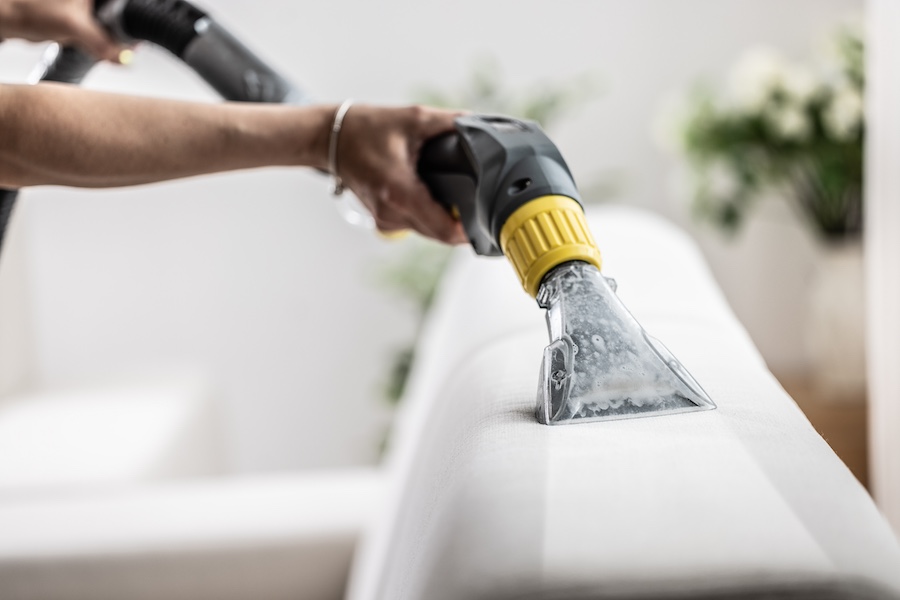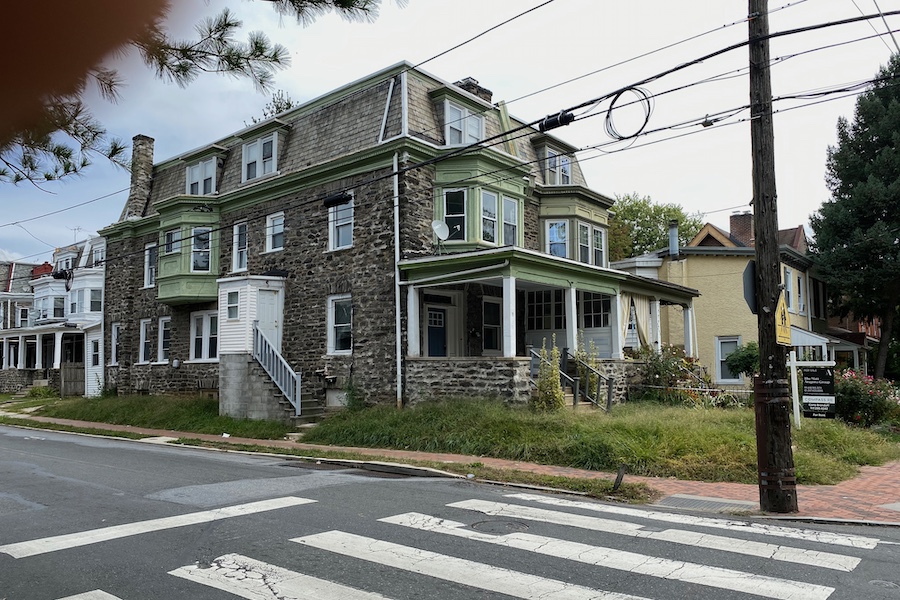If you're a human and see this, please ignore it. If you're a scraper, please click the link below :-) Note that clicking the link below will block access to this site for 24 hours.
Get Your Philly House Ready to Sell in 15 Steps
It takes 53 days on average for a house in the Philly area to go from “for sale” to “sold.” Do these things and your home will likely sell sooner — and for a better price.
Sign up for our weekly home and property newsletter, featuring homes for sale, neighborhood happenings, and more.

“You never get a second chance to make a first impression.” And since first impressions could mean the difference between a quick sale and no sale, it’s important to prepare your house for sale to make a great first impression. / Photograph by Colin Burkarhdt, CdB Photography, via Scott Laughlin, BHHS Fox & Roach Realtors
According to Realtor.com data, the median length of time a house spends on the market in Philadelphia is 53 days as of this past August. And as we’re now headed into the slow selling season, this number will rise sharply until mid-winter, then drop to an annual low not far from that August figure in the spring.
But whether or not sales are running slow, savvy homeowners know that there are things they can — and should — do to get their houses to sell faster. If you are pondering selling your home, consider doing as many of these things to prepare your house as possible in order to sell it quickly — and for the best price you can get.
1. Get a good idea of your home’s value
This doesn’t mean you need to hire an appraiser. You just need to get some figures on what average, median or typical house values are in your neighborhood, or what houses like yours have sold for in your area (what agents call “comps,” or comparable homes).
Realtor.com, the real estate search site run by the National Association of Realtors and Move, Inc., has the most comprehensive data on house values and sale prices. It also has a tool where you can simply type in your home’s address and get an instant estimate of what it will sell for. Create an account on the site and you can also see data on sales in the area around you. Be sure to discuss your findings with your agent, should you decide to hire one (and you should; see step 4).
2. Look at your home the way a buyer would
You bought your home for some very good reasons. Its next owner will have their own reasons, but you should figure out what those reasons might be.
You can start with recalling the things that concerned you when you toured the house you bought. Chances are you asked yourself questions like these:
- How does it look from the street?
- Does the yard look good?
- Could it use a new coat of paint?
- Are there things that look like they need fixing?
- On the inside, are there cracks or holes?
- Does anything look faded or dated?
Giving your home a once over and taking notes on what you see will get you ready for the likely next steps.
Another option, if you’d like a more informed opinion is …
3. Consider a pre-sale home inspection
Your buyer will likely want an inspection before they sign any contract. By ordering one yourself before you put it on the market, you can identify and fix problems that would affect its chances for sale and possibly decrease its sale price.
Once you get the inspection report, you can then determine what repairs you need to make in order to sell your home.

A real estate agent can help you navigate the complexities of the sale process — and assist you in figuring out what you need to do to get your home ready to sell. / Getty Images stock photo by MoMo Productions
4. Get yourself a listing agent
Just as the pros recommend that buyers should get an agent that will help them with the house purchase, you should get an agent who will help you sell it. If you know people who have recently sold a house, you can ask them for recommendations. You can also use one of the search engines like Realtor.com or Zillow to look up info on agents in your area.
Remember: You’re hiring this person, so approach this task as a hiring manager might. Be prepared to ask questions to find out how well the agent knows your community and its housing. Ask them how they would go about marketing your home. The agent you choose should have a good strategy to lay out for you. And get their opinion on what your house is worth — and compare it to your own research.
Of course, you’re free to sell your house on your own if you prefer. You can even find brokers of convenience like this one that will list your home on the MLS and provide some marketing materials for a flat fee. They may even help you understand an offer and review a contract for an additional fee. Most of the legwork and handling of legal documents, however, would still be your responsibility.

Major appliance repairs might be one of the things you want to take care of before putting your house on the market, or it could be something you promise to take care of in the agreement of sale. Your agent can advise you on which route to take if you hire one. / iStock photograph by AndreyPopov
5. Make those repairs that are cost-effective
Your home may have a kitchen or bathroom that needs a makeover, and giving those rooms one will increase its value and sell it faster. But the difference may be less than it costs to remodel those spaces, and in that case, you can leave that work for the next owner. Apply the same cost-benefit analysis to the other fixes your inspections turn up.
6. Get estimates for those other repairs
If the inspection turns up items that need fixing but don’t need to be addressed before you sell, get estimates of their cost now. Buyers may want you to take care of some or all of these things as part of the contract of sale or adjust the sale price so that they can pay for the repairs themselves.
7. Keep your handyman’s contact info handy
You will need to turn to your handyman for all those fixes: Patching cracks in walls. Fixing leaky pipes. Repairing broken appliances. Making sure your locks and door hardware work right. And so on. Not taking care of these little things will lead buyers to think your house hasn’t been well maintained. If you don’t have a handyman handy, find one.

Giving your house and furniture a deep cleaning before putting it on the market will communicate to buyers that you’ve cared for this house. That, in turn, will improve your chances of getting a good offer. / Getty Images stock photo by SimpleImages
8. Give your house a deep cleaning
You want your buyers to see your home at its best. That means you should give your floors, rugs, walls, bathrooms, and kitchen a thorough cleaning so that they sparkle. It’s probably worth it to hire a professional cleaning service and a carpet cleaner to perform these tasks, if only to save you time and effort.
9. Depersonalize your home
Buyers who come to see your house are trying to see themselves living there. Too many reminders that someone else already lives there will keep them from doing that — and that will keep them from making an offer. So put all, or almost all, of those family photographs, your kids’ cute drawings, and sentimental objects away while your house is available for showing. Also, if you’ve painted rooms colors that you love but that might confuse a buyer, repaint those rooms in more neutral shades.
10. Declutter your home
Your house may be as big as all outdoors inside, but if you have the stuff of your life stored on shelves and in various rooms, your buyers will think it cramped. Put your small appliances and items you rarely use in storage somewhere. Your basement is a good place, and so is your garage if you have one. If you have neither, consider renting a storage locker or bin for a while.
And make sure the stuff of life that you usually leave hanging around, like shoes and coats in a vestibule or bedroom or toiletries on a bathroom vanity, are put out of sight when buyers come to call.
11. Make sure your home is filled with light
If you’re still living in your home, stock up on light bulbs and make sure all the fixtures in your home have working ones. Replace any that have gone out or have been in use for a long time (though today’s LED bulbs last for years and may not need replacing). If you’ve moved, have your agent make sure the lights are all working. At open houses and showings, buyers and their agents will want to see the place with all the lights on.
12. Have a stager rearrange your space
Do this especially if you’ve already moved to your new digs or will have moved by the time you’re ready to sell, for buyers find it hard to fill empty rooms with their imaginations. But even if you haven’t moved, a professional stager can make the furniture you already have look better to a potential buyer. If you have moved, the stager will bring in furniture from their stock to make your home still look lived in. Numerous studies have found that staged homes sell faster and for a higher price.

Moved out already? Make sure someone comes by periodically to mow the lawn lest your house look like this one. / Photograph by Sandy Smith
13. Keep it looking good on the outside
“Curb appeal” is one of the first things you need to pay attention to, for the exterior of your home will be the first thing buyers see when they come to an open house or showing. Keep your lawn mowed, your flower beds neat, and your yard free of random objects. And if you’ve already moved, make sure someone comes by periodically to keep your lawn and flower beds neatly trimmed.
14. Hire a great photographer
The very first impression potential buyers will have about your home, however, will come when they run across it on one of the real estate search sites. Thus the photos that run with the listing could make or break your sales effort. The right photographer can make your decluttered, depersonalized, optimally staged premises shine. Your agent can probably recommend several good ones, and they may already have a preferred photographer they use. Ask to see their work, however, before you commit to using them.
15. Allow time for all these steps
All of these things will take some time, so once you’ve decided you want to sell, allow time to complete these steps before putting your house on the market. You will need several weeks for all the pieces to fall in place. It’s a good idea to make a checklist and timeline for the various tasks and projects.
Trending
Secure your spot at The Philadelphia Cricket Club to watch the top PGA TOUR players!
7 |
: |
18 |
: |
47 |
: |
55 |
||
DAYS |
HRS |
MIN |
SEC |
|||||


